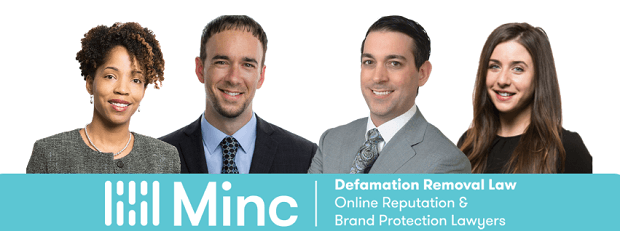* – This article has been archived and is no longer updated by our editorial team –
Minc Law is the first law firm to be dedicated solely to Internet defamation, allowing them to provide the most specialized and highly experienced representation for their clients. Below is our recent interview with Aaron Minc, Managing Member at Minc Law:

Q: Aaron, tell us something more about your services, technical and business expertise?
A: Our attorneys draw on specialized technical and business expertise to provide a full range of services to help businesses of all sizes and individuals from all walks of life control their online image and reputation and identity and stop anonymous cyberattacks. We’ve successfully represented clients in hundreds of Internet defamation-related cases pertaining to online defamation, cyberbullying and online harassment, revenge porn and privacy, online investigations, content removal, expert testimony, online reputation management and repair, and litigation. We understand not only the legal nuances of each case, but also the private and intimate nature of our clients’ distress. As such, we provide each client with both aggressive representation and respectful and compassionate guidance.
Q: What is the definition of online defamation?
A: Online defamation, also known as Internet defamation or character defamation, is the legal term for when a person’s reputation is harmed via a false assertion of fact that is published or communicated to a third-party. Defamation of character is broken down into two fundamental types: libel and slander.
Libel is written or published communication (pictures, video, and/or other media forms) of a false statement to a third-party, while slander is the spoken and verbal communication of a false statement to a third-party. In both cases, the defamatory content ultimately causes harm or damage to another’s reputation.
 Recommended: Kryptoin ETF Enables Creation Of A Token That Represents A Basket Or Index Of Cryptocurrencies
Recommended: Kryptoin ETF Enables Creation Of A Token That Represents A Basket Or Index Of Cryptocurrencies
Q: What are cyberbullying, cyber harassment, and revenge porn?
A: Online bullying is any type of bullying that takes place online or through technological means. Cyberbullying (both the victim and the perpetrator are underage) and cyber harassment (the victim and/or the perpetrator are an adult) include any means of electronic communication that can be used to threaten, intimidate, harass, or transmit insults.
Nonconsensual pornography is a specific form of cyber harassment that includes the distribution of sexual, compromising photographs or videos online without the victim’s consent. The photographs and videos may have been taken in secret, stolen through the hacking of emails and cellphones, or willingly shared with the perpetrator with the expectation that the content would remain private. The most widely publicized and growing form of nonconsensual pornography is revenge porn.
Q: What are the limits of defamation law?
A: Defamation law is meant to balance protection from false, harmful, and malicious statements with the First Amendment’s protection of free speech. As such, a defamation claim is only valid if the statement published is actually false and was negligently communicated and published to a third party. In other words, the party published material they knew to be false and acted maliciously or recklessly in doing so. In addition, the information was privileged or protected under an exception and the party did not have consent to publish it. Finally, the statement has to have hurt and caused damages to the plaintiff. Simply put, a statement is considered defamatory if it adversely affects a business or person’s reputation, lowers their standing in the eyes of the community, or deters third parties from associating or dealing with them.
Q: Is defamation insurance necessary? What does it actually do?
A: Defamation insurance is a protective measure that can be taken to preserve a business or person’s financial status quo and livelihood. When evaluating whether to opt for defamation insurance, it is important to assess whether you, your profession, or business frequently engages in publication, advertising, or promotional activities. Parties who engage in the such activities are more likely to find themselves in situations that could lead to a defamation claim, making defamation insurance something to seriously consider.
Homeowner’s insurance policies typically allow someone to include “excess liability” coverage, a policy issued to provide additional limits above and beyond primary liability policies. Think of excess liability coverage as an umbrella policy where you’re provided further coverage if your primary policy fails to cover something. For example, if you have “excess liability” insurance and are facing a claim of defamation, you may have the expenses of defending the claim or even a portion of the settlement amount covered.
 Recommended: Afinia L501 Compares To Pigment-Based Inkjet Label Printer Competitors, The Primera LX2000
Recommended: Afinia L501 Compares To Pigment-Based Inkjet Label Printer Competitors, The Primera LX2000
When determining whether or not to obtain defamation insurance, it is important to take into account several considerations. First, keep in mind that each insurance policy is different, and there is no guarantee your insurance company or policy offers such coverage. There are also exceptions to coverage. Defamation insurance only provides coverage to parties who acted in good faith or unknowingly; not to parties who published material they knew to be false or who acted recklessly publishing such information. Additionally, if you own a business and make defamatory statements about a competing business or contractor, you would be precluded from defamation coverage since the statements were made for economic gain. Your profession also dictates the type of defamation coverage needed. If, for example, you are a freelance journalist or independent contractor, basic general liability policies often fail to cover certain nuances and intricacies of media law, opening you up to liability for content published and disseminated by media organizations and outlets. Think of defamation and media liability insurance as an essential cost of doing business.
Q: What is the most common reason people come to you?
A: Our clients come to us because their business or reputation is being harmed or destroyed by malicious, defamatory online posts. Often these posts are made by a business looking to harm a competitor, a jealous ex-boyfriend or ex-girlfriend looking for revenge, or a stalker or other individual looking to harass our clients. Our goal is to remove the harmful content and stop the online harassment or cyber stalking as quickly as possible.

